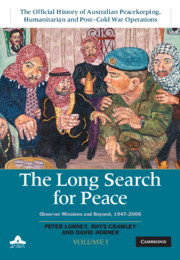Book contents
- The Long Search for Peace
- The Official History of Australian Peacekeeping, Humanitarian and Post–Cold War Operations
- The Long Search for Peace
- Copyright page
- Contents
- Maps
- Preface
- Glossary
- Part 1 Actor and observer
- 1 The origins of peacekeeping
- 2 St George and the maiden
- 3 Inventing peacekeeping
- 4 Failure
- 5 Success
- 6 Observing at a critical moment
- 7 An intractable dispute
- 8 ‘Tough men wanted’
- 9 Australia and the problem of Palestine
- 10 The Six Day War and after
- 11 ‘If you’re not confused, you don’t understand the situation’
- 12 Over jungle and swamp
- 13 A reluctant start
- 14 The first decade
- 15 Australia and the invention of peacekeeping
- Part 2 New ambitions
- Part 3 Carrying on
- Conclusion
- Book part
- Bibliography
- Index
- Plate Section (PDF Only)
14 - The first decade
Australian police in Cyprus, 1964–74
from Part 1 - Actor and observer
Published online by Cambridge University Press: 27 September 2019
- The Long Search for Peace
- The Official History of Australian Peacekeeping, Humanitarian and Post–Cold War Operations
- The Long Search for Peace
- Copyright page
- Contents
- Maps
- Preface
- Glossary
- Part 1 Actor and observer
- 1 The origins of peacekeeping
- 2 St George and the maiden
- 3 Inventing peacekeeping
- 4 Failure
- 5 Success
- 6 Observing at a critical moment
- 7 An intractable dispute
- 8 ‘Tough men wanted’
- 9 Australia and the problem of Palestine
- 10 The Six Day War and after
- 11 ‘If you’re not confused, you don’t understand the situation’
- 12 Over jungle and swamp
- 13 A reluctant start
- 14 The first decade
- 15 Australia and the invention of peacekeeping
- Part 2 New ambitions
- Part 3 Carrying on
- Conclusion
- Book part
- Bibliography
- Index
- Plate Section (PDF Only)
Summary
By June 1964, Unficyp had done much to contain military action and prevent a recurrence of open fighting. In addition to its traditional military functions, which were meant to deter a resumption of hostilities, it had also performed non-traditional roles: helping to restore public services, including the courts, and assisting trade and commerce by reopening factories and enabling agricultural work to continue. Moreover, it escorted the transportation of food, essential material, and people on the island’s roads, constructed shelters at refugee camps and reduced fortifications across Cyprus. In spite of this good work, however, its presence had not yet stopped communal violence between Greek and Turkish Cypriots, nor had it made any progress towards disarming civilians.
- Type
- Chapter
- Information
- The Long Search for PeaceObserver Missions and Beyond, 1947–2006, pp. 347 - 377Publisher: Cambridge University PressPrint publication year: 2019

